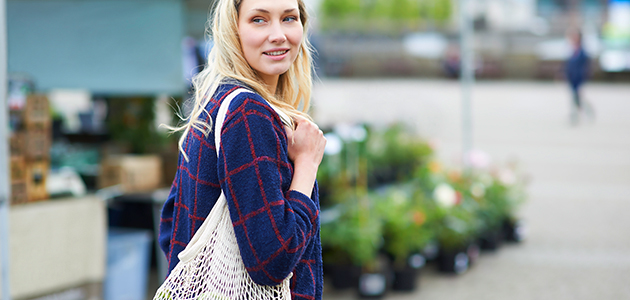
Plastic has made our modern lives so much more convenient. Virtually everything we buy is made of, wrapped in, stored in, or taken home in some form of plastic. But that convenience has come at a dangerous cost.
According to UN Environment, it’s estimated that more than 8.3 billion tonnes of plastic has been produced since the early 1950s, and 60% of that has ended up in either a landfill or in our lakes, oceans, beaches, and in other natural environments.1
Aside from the fact that plastic is made using chemicals derived from oil, natural gas, and coal—all dirty, non-renewable resources—plastic also takes centuries to degrade, and will usually never completely break down. The plastic pieces just get smaller and smaller, sometimes finding their way onto our dinner plates after fish and farm animals have mistakenly eaten them.
What can you do?
April is Earth Month, and April 22 is Earth Day, so it’s the perfect time to start making a real effort to reduce our own reliance upon plastic.
- Avoid single use plastic grocery bags. Take reusable mesh bags to the grocery store when you’re shopping for produce, and bring your own reusable bags to bag up the rest of your groceries. Some grocery stores have already stopped offering plastic grocery bags, so thankfully the shift is already happening. If you’re crafty, you can even make your own market bags! Check out Wee Folk Art for 23 free crochet, knit, and sewing patterns.
- Avoid single use, resealable sandwich and snack bags. Zip-top bags are definitely convenient, but they are almost always used once and thrown away. There are now alternatives to these bags that are made of silicone or cloth, depending upon your need. Visit Good Housekeeping to find out more.
- Buy reusable metal or silicone straws. Always refuse plastic ones if they are offered to you at a restaurant.
- Shop in bulk. Buy in bulk, which is cheaper, and bring your own clean, reusable containers to fill up.
- Use a razor with replaceable blades. Disposable razors are only good for a handful of shaves, then the entire thing is tossed. Choosing a razor that simply requires replaceable blades will eliminate the plastic waste.
- Bring a container for leftovers. If you know you’re someone who can’t finish a restaurant meal, bring your own clean container to pack away the leftovers. Restaurants usually use Styrofoam containers for leftovers.
- Switch to cloth diapers. An estimated 7.6 billion pounds of disposable diapers are thrown out annually in the United States alone.2 Instead, try using cloth, which are a lot cheaper and more environmentally friendly.
- Use bar soap and bar shampoo. Liquid soaps and shampoos always come in plastic bottles, so give bars a try instead. Visit Elle for more information on the benefits of bar shampoo.
- Make your own condiments and salad dressings. Not only will they taste better and be cheaper than store-bought, but you can also store them in reusable glass jars.
- Carry your own reusable water bottle. 90% of plastic water bottles end up in landfills instead of being recycled, so purchase a reusable bottle and carry it with you.3
Whenever you can, choose a product that doesn’t contain plastic, or contains less plastic than usual. Look for bamboo hair brushes, combs, and toothbrushes; try reusable silicone cotton swabs or swabs with a paper shaft instead of plastic, and check out beeswax food wraps to replace plastic wrap.
Whenever it seems like too much hassle, just remember that the plastic bottle, grocery bag, or shampoo bottle that you threw out today will still be here 1000 years from now. Every single time you choose not to use plastic you’re helping preserve a brighter, healthier, and safer future for generations to come.
Visit Money Saving Expert for more tips on how to reduce your plastic consumption.
SOURCES
1 https://www.unenvironment.org/interactive/beat-plastic-pollution/
2 http://www.greeneducationfoundation.org/nationalgreenweeksub/waste-reduction-tips/tips-to-use-less-plastic.html
3 https://www.50waystohelp.com/
417949E CAN/US 04/20


